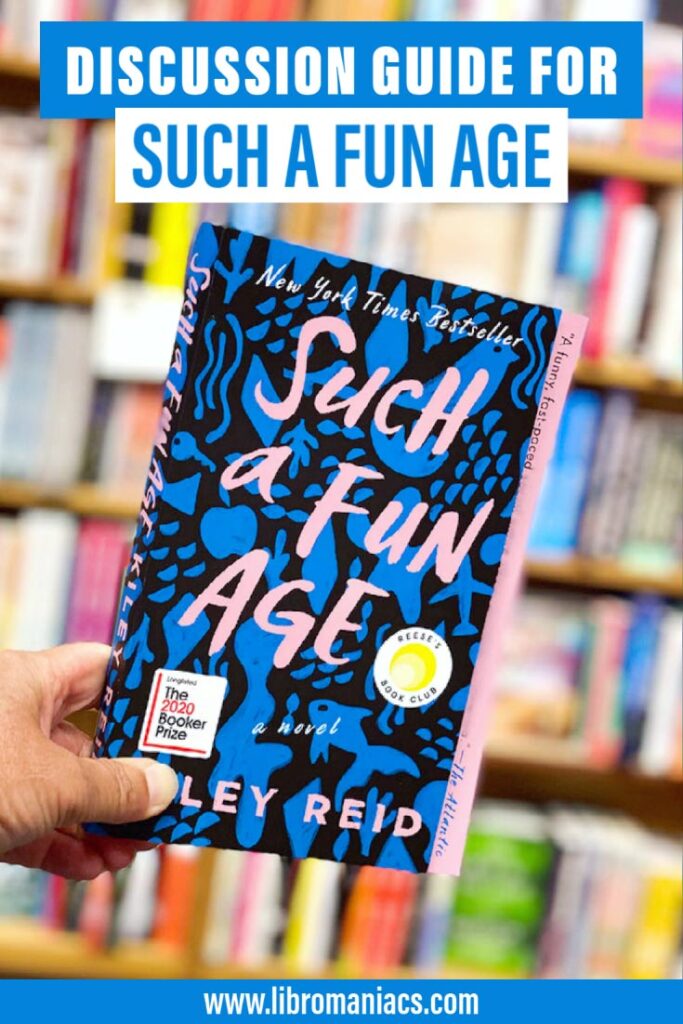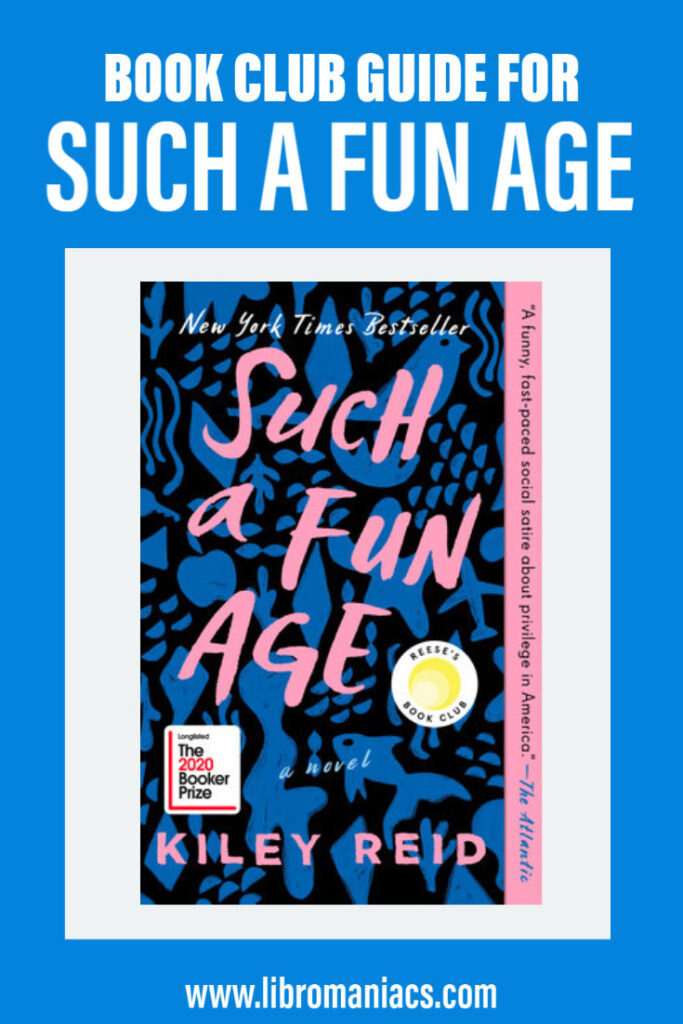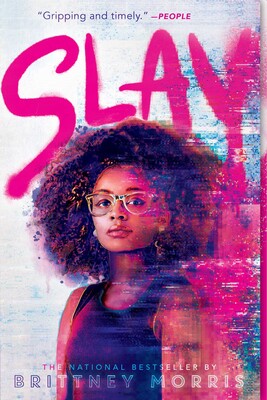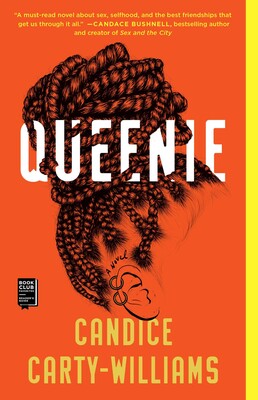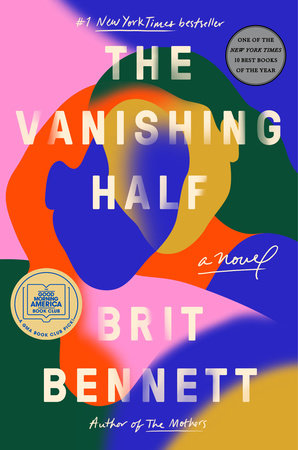Such a Fun Age was originally published in December of 2019, which was the front end of the Black Lives Matter wave. Author Kiley Reid really saw that wave coming and she crafted a book that spotlights how both casual and overt racism exist in the life of the main character Emira. The book also captures the nature of White fragility, class power dynamics and how White Saviour complex can be so destructive.
The class and race divide between the book’s characters are what makes Such a Fun Age such a great book club read. And Resse agrees as this was the January 2020 Reese’s Book Club pic. The book was also longlisted for the Booker Prize in 2020.
There’s a lot to unpack with this novel, so we’ll help you spark your conversation with these Such a Fun Age Book Club questions.
Start your book club discussion by looking at the publisher synopsis below. Does it accurately reflect your experience of the book. If not, how might you rewrite it?
Then take a look at the 10 Such a Fun Age book club questions and read the selected reviews to jump start your discussion.
If you liked the book, we’ve also suggested three more books like Such a Fun Age to add to your TBR pile.
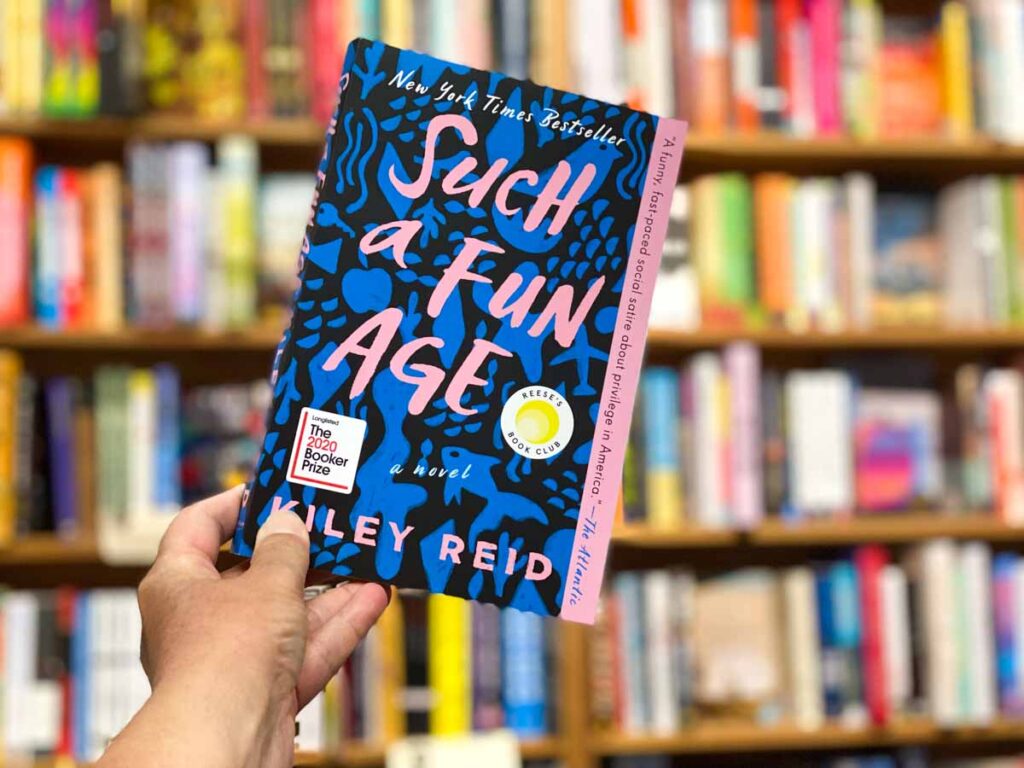
(This article contains affiliate links. This means that if you choose to purchase, I’ll make a small commission.)
Such a Fun Age Synopsis
Such a Fun Age, by Kiley Reid
A striking and surprising debut novel from an exhilarating new voice, Such a Fun Age is a page-turning and big-hearted story about race and privilege, set around a young black babysitter, her well-intentioned employer, and a surprising connection that threatens to undo them both.
Alix Chamberlain is a woman who gets what she wants and has made a living, with her confidence-driven brand, showing other women how to do the same. So she is shocked when her babysitter, Emira Tucker, is confronted while watching the Chamberlains’ toddler one night, walking the aisles of their local high-end supermarket. The store’s security guard, seeing a young black woman out late with a white child, accuses Emira of kidnapping two-year-old Briar. A small crowd gathers, a bystander films everything, and Emira is furious and humiliated. Alix resolves to make things right.
But Emira herself is aimless, broke, and wary of Alix’s desire to help. At twenty-five, she is about to lose her health insurance and has no idea what to do with her life. When the video of Emira unearths someone from Alix’s past, both women find themselves on a crash course that will upend everything they think they know about themselves, and each other.
With empathy and piercing social commentary, Such a Fun Age explores the stickiness of transactional relationships, what it means to make someone family, and the complicated reality of being a grown up. It is a searing debut for our times.
Such a Fun Age Book Club Questions
- Alix’s brand is all about the strong confident woman who goes after what she wants. Yet, she is particularly concerned with appearances, going so far as to hide the move to New Jersey on her social media channels. How confident is she really?
- On the other hand, Elmira lacks ambition. She’s under-employed, doesn’t know what to do with her degree and isn’t keen to make waves. Even after the events of the main narrative, she is happy to be an admin for another successful, confident woman. “Emira didn’t love doing anything, but she didn’t terribly mind doing anything either.” Discuss the contrast between Emira’s approach to life and that of her bosses.
- Briar is a quirky, intelligent kid who doesn’t easily fit into Alix’s brand narrative. Emira loves her dearly, but Briar’s parents are emotionally absent. Looking past the end of the book’s narrative, will Briar be OK?
- Alix tries desperately to befriend Emira. However, Emira tries very hard to hold the line as an employee. Where would that line have been for you? What did you think about the use of the t-shirt as an employee uniform?
- There’s a whole “I’m your White ally” thing going on between Emira and both Alix and Kelley. They make pronouncements of support without ever considering what Emira wants or needs. How does this affect Emira’s life? What kind of an ally are you?
- After Kelley takes the video of Emira in the grocery store, she asks him not to release it. Did you understand her request? What might you have done if you were in her position?
- Reid says of the grocery store racial profiling incident, “I hope readers take away the feeling of a low-to-the-ground and domestic terror, that it can and does happen everywhere. That these moments aren’t self-contained and continue to shape everyone involved, particularly the African Americans who have to mentally carry the event with them to every job and grocery story from that time on.” Have you ever been on the receiving end or witnessed this sort of low-to-the-ground terror?
- In college, Kelley tells Alix, “I think it best we went our separate ways, and that those paths never crossed again.” He thinks the break-up was honest and forthright but Alix was blasted sideways by it. Have you had a break-up like that? One where you each came away with a completely different recollection?
- “That boy likes to talk.”, Amira’s friend says about Kelley. “Kelley definitely did that thing where he asked her questions with the intention of explaining his own answer afterward.” As you learn in the narrative, he also tended to “collect” African-American women. And yet, at times, he also had a positive influence on Emira. In the end, was their relationship a net positive or a net negative for Emira?
- How did you hear about Such a Fun Age and what made you want to read it?
Selected Reviews for Such a Fun Age
“Narratives about race and privilege are not unfamiliar literary fodder, but in her novel, Reid demonstrates a remarkable insight by taking on the monumental challenge of revealing the state of America through what she called the “everyday domestic biases that we don’t even know we have.” Reid’s exploration is a fresh and interesting look at the uneasy performance of “wokeness”—a paper-thin tissue of a word, so conspicuous that it now immediately breeds distrust.”
Though it is clearly a critique of “white saviours”, Reid is careful not to let the characters fall into one-dimensional stereotypes. She uses these fully-fleshed out characters to explore the way well-meaning white people often overstep and actually make black people’s lives harder. “Protecting” and “helping” as a means of control is nothing new, but the author really shines a light on the way white liberals use these words to take over situations and narratives.
“…I couldn’t get on board with the writing. I understand this is a debut novel, but wow. The writing just did not click I had trouble liking any of the main characters with the exception of sweet little Briar. She was so special and unique! I felt sorry for Emira and wanted to help her but she can’t make a decision about her future. She continues to spin in place while her life revolved haphazardly around her. Alix and Kelley are horrible and all the friends of everyone are annoying. Not connecting with the characters is always a big deal breaker for me!”
“I think the biggest issue I had with this novel was trying to connect with any of the characters. Besides the relationship between Emira, and her charge, which was genuine and heartwarming, the story itself failed to draw me in deeply enough to become passionate about it.”
3 Books Like Such a Fun Age
If you are working your way through Reese’s Book club, then also check out our book club guide for Northern Spy. And if you are interested in reading more about race and class, check out our reading guides for Born a Crime, by Trevor Noah, Caste by Isabel Wilkerson, The Revisioners by Margaret Wilkerson Sexton, Chain Gang All-Stars by Nana Kwame Adjei-Brenyah, or Girl, Woman, Other by Bernadine Evaristo.
And for more coming of age stories, try Tomorrow, and Tomorrow, and Tomorrow and our Maame discussion guide.
Slay
by Brittney Morris
If you were frustrated by Emira’s passive nature and lack of ambition, then you are going to love Kiera, the main character in Slay. She’s an honor student and the only Black kid in her school. At home, she joins other Black gamers who duel one another as Nubians in the secret multiplayer game, SLAY. Little does everyone know that Kiera created the game and when a fellow gamer dies in real life, things get very complicated.
Queenie
by Candice Carty-Williams
This book has been billed as a cross between Bridget Jones’s Diary meets Americanah. Queenie is a 25 year-old Jamaican British woman living in London, straddling two cultures and slotting neatly into neither. A bad break-up topples the dominos, causing Queenie to hit bottom. She then has to truly face herself and figure out what she really wants.
The Vanishing Half
Brit Bennett
Bennet’s novel explores racial identity and how “passing as White” can have a profound effect upon your life experiences, especially during the mid-1900’s. The story follows two identical twins who grew up in a small Southern town. One stays in the South, raising a black child. The other, skeddadles to a life with a White husband and a daughter who doesn’t know that she’s mixed race. This poignant and emotional book has great characterization and prose.
If you read it for book club, use our Vanishing Half discussion guide.
Have a listen on Audible. Try audio books for free for 30 days.
Share this Such a Fun Age discussion guide on Pinterest:
